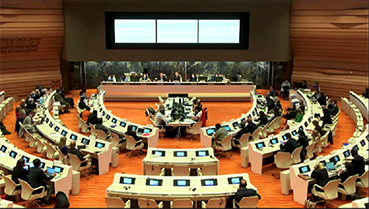On June 10, 2022, the International Labour Conference adopted the Resolution and Conclusions of the General Discussion Committee on decent work and the social and solidarity economy (SSE). During the deliberations, the ILO Constituents recognized that a robust SSE could contribute to balanced, inclusive, resilient and sustainable economies and societies.
This general discussion was the first comprehensive deliberation on the social and solidarity economy at the International Labour Conference. It is also the first high-level debate in the UN system on the subject. Although the social and solidarity economy is not new, its policy importance and visibility have grown significantly since the turn of the century.
The Report, Resolutions and Conclusions from the Committee were a result of 10 days of deliberations that took place in three segments. During the first segment on May 30 and 31, the delegates concentrated on four points for discussion. The four points were discussed during four sittings across two days and focused on:
- What should be a universal definition of the social and solidarity economy?
- How can the social and solidarity economy contribute to decent work and sustainable development?
- What can governments, workers’ and employers’ organizations do to promote the SSE’s contribution to human-centred recovery?
- What actions can the ILO take to promote the social and solidarity economy?
Based on these two days of deliberations, the Office prepared and submitted tentative conclusions for review.
The third segment of the General Discussion Committee started on June 6, 2022, to review the amendments to the draft conclusions. The tripartite delegates deliberated in the true spirit of social dialogue on the amendments and arrived upon a set of Conclusions on June 9, 2022. The Conclusions reflect the roles that SSE entities can perform. They underline the potential of the social and the solidarity economy to uplift persons facing vulnerable situations, including women, youth and persons with disabilities. The Conclusions are structured as follows:
Part I, entitled “Introduction”, recalls the links between the social and solidarity economy and the ILO by directly referencing the ILO Constitution, including the Declaration of Philadelphia, relevant international labour standards and declarations that explicitly recognize the importance of the social and solidarity economy in its various forms, in promoting sustainable development, decent work, productive employment and improved living standards for all.
Part II provides a clear and comprehensive “Definition of the SSE” based on a set of values and principles. This is the first agreed tripartite definition of the social and solidarity economy at the international level.
Part III spells out the “Guiding principles to address challenges and opportunities” to promote decent work and the social and solidarity economy for a human-centred future of work.
Part IV explains “The role of governments and the social partners” in fostering the social and solidarity economy’s economic, social and environmental contributions.
Part V, entitled “The role of the ILO”, provides recommendations for Office action and key principles that underpin such action.
Speakers from the Committee who presented at this Plenary included: the Employers Vice-Chairperson, Ms Aline Valérie Mbono, from Cameroon; the Workers Vice-Chairperson, Ms Toni Moore, from Barbados; Rapporteur for the Committee, Mr Colin Jordan, the Minister of Labour of Barbados; and Chairperson of the Committee, Mr Adam Lee, from the USA. The Conclusions provide sufficient guidance to the Constituents and the Office on the promotion of decent work in and through the SSE for years to come.
For more information on the work of the General Discussion Committee, see:
Download resolution on decent work and the social and solidarity economy







